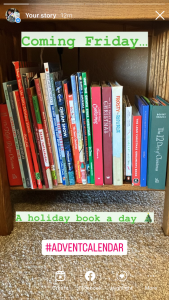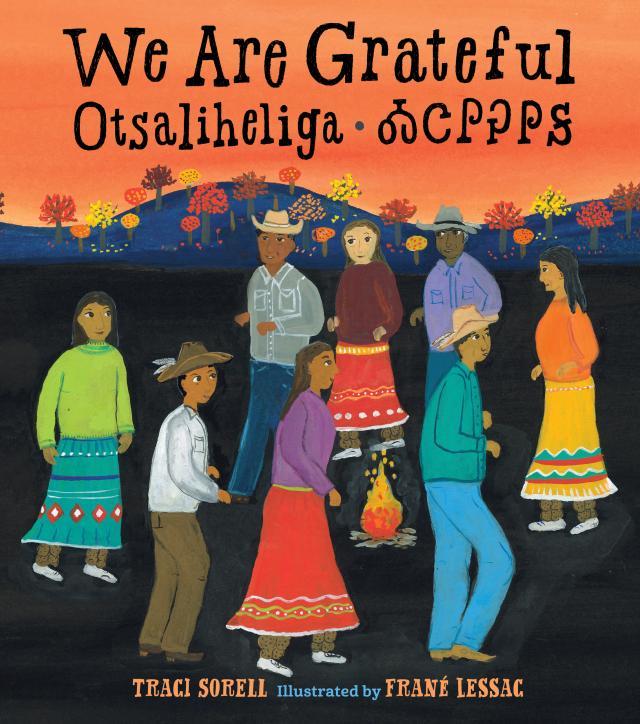Happy holiday season all!
My Christmas tree is decorated, my nutcracker collection is out, and I have Harry (Connick Jr.) for the Holidays playing at top volume over my speakers. Can you feel my excitement?
I hope you’ll join me on X or Instagram starting Friday, Dec. 1 where I’ll share a holiday book a day. It’s a tradition I started years ago when my kids were tiny (see above photo). Now that they are teens (and tower over me), I’m inviting you to explore these books with me, one for each day of the advent season. I have a whole bunch of new titles on hold at the library thanks to recommendation by my writer friends at the 12×12 Picture Book Challenge.

In the meantime, if you are a caregiver or teacher and want a fun countdown to the holidays, here’s my original post about creating a book a day advent calendar.
Reposted from Nov. 29, 2011–
Growing up, I remember our advent calendar held a small candy cane for each day until Christmas. My brother, sister and I would eagerly take turns removing the candies (even though peppermint isn’t my favorite). We have a traditional advent calendar in our house now; each day the boys remove a different figure from a numbered pocket and velcro it onto the manger scene. Since Thanksgiving, my older son has been asking me if it’s December 1st yet, so he can start creating the scene.
Because this is such a special time of year, I’m always interested in new ways to count down to Christmas. My friend Nancy recently shared a good one: a holiday book a day. Here’s how it works. Scour your children’s book collection for 25 books about the holiday season. Don’t have 25 books? Neither do I, so I also included books about winter and snow. For example, I include The Snowy Day by Ezra Jack Keats and Katy and the Big Snow by Virginia Lee Burton. You can also visit your local library to supplement your collection. Just make sure to keep those at the front of the pile so they don’t become overdue! Also consider that booksellers may have holiday books on sale during the holiday season.
Once you’ve amassed your pile, find a nice basket to hold all your books, and put it in a special spot, for example under your tree, by your fireplace or on a side table in the family room. Then it’s time to start wrapping! Pull out the wrapping paper, ribbon and bows, wrap each book and place it in the basket. (Note: You could use your recycled holiday cards to help decorate.) There’s nothing children love more during the holidays than unwrapping a present. Designate a special time each day (first thing in the morning or bedtime, for example), and let each child take turns unwrapping a “present.” Then you can all enjoy reading the book together. What a nice holiday tradition!





 First, mea culpa! I feel terrible for neglecting Curious Kids. I’m talking about the blog, mind you, not the actual kids. The real kids are rested, fed and dressed in clean clothes. At least their clothes were clean this morning. Right now, there are no guarantees.
First, mea culpa! I feel terrible for neglecting Curious Kids. I’m talking about the blog, mind you, not the actual kids. The real kids are rested, fed and dressed in clean clothes. At least their clothes were clean this morning. Right now, there are no guarantees. A few weeks ago I put out the call on my Facebook profile: “How much allowance should one give a kindergartener.” My favorite responses included, “two graham crackers” and “hugs and kisses.” (You know who you are.) Others chimed in with suggestions like “$1 per year of age” or “10 cents per chore per week.”
A few weeks ago I put out the call on my Facebook profile: “How much allowance should one give a kindergartener.” My favorite responses included, “two graham crackers” and “hugs and kisses.” (You know who you are.) Others chimed in with suggestions like “$1 per year of age” or “10 cents per chore per week.” Today was the first day of school. It was a day of new beginnings. Cooper started kindergarten. Finley started preschool. Both were at a new school.
Today was the first day of school. It was a day of new beginnings. Cooper started kindergarten. Finley started preschool. Both were at a new school.
